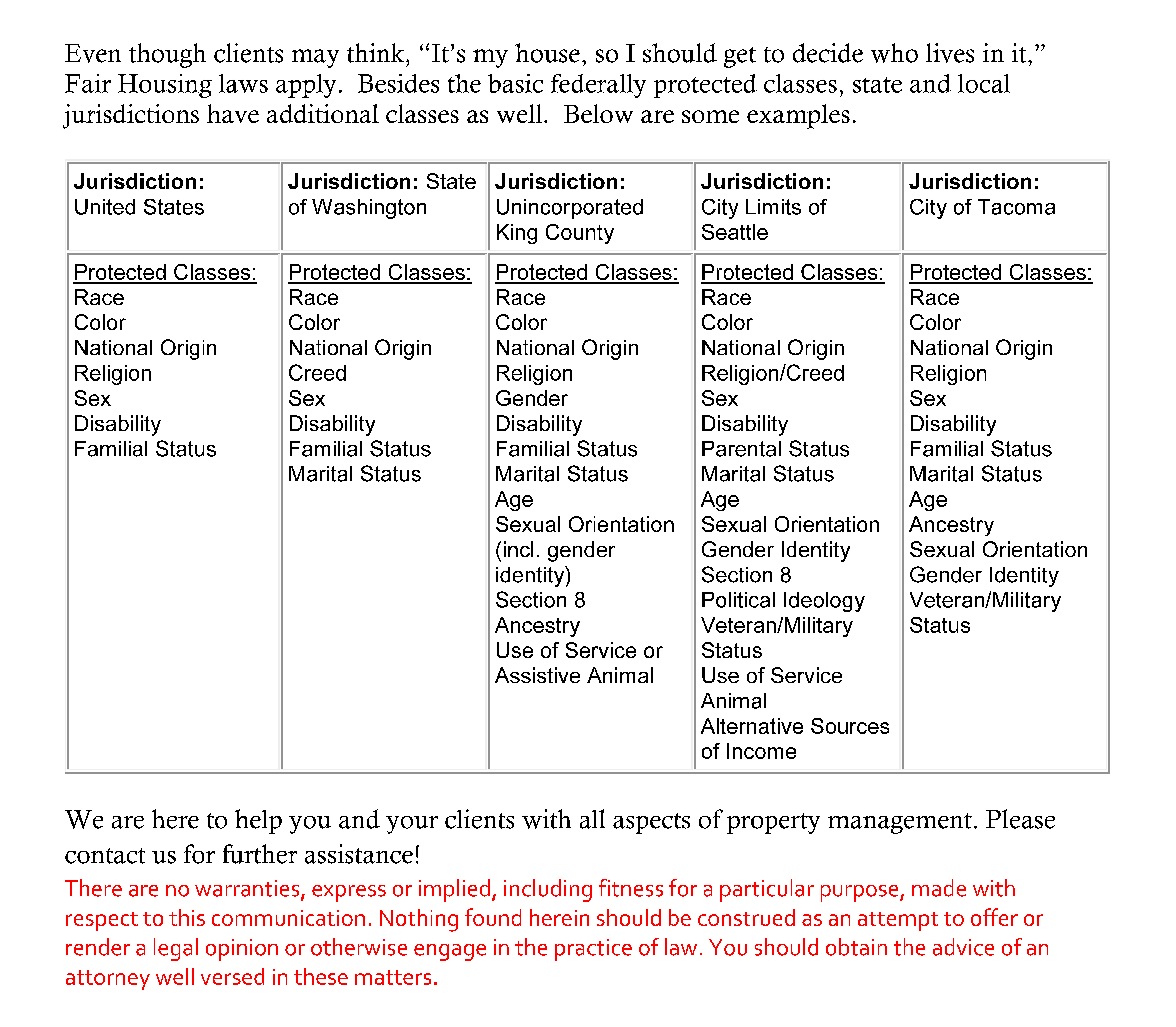CONTRACTOR REFERRALS
Referring a contractor who is not licensed, bonded and insured increases your liability and puts your clients at risk. The person hiring someone who is not licensed, bonded and insured becomes potentially responsible for damage caused by unlicensed
Assignment & Subletting – Commercial Leasing
Most commercial leases prohibit a tenant from assigning or subleasing the leased premises to another party without first obtaining the landlord’s consent. Often, a commercial tenant will execute a lease failing to insert language that a landlord will act reasonably when a tenant requests the landlord’s consent to an assignment or sublease. A tenant, at the very least should negotiate that a landlord’s consent to an assignment or sublease should “not be unreasonably withheld, conditioned or delayed.” A tenant needs to be concerned with this clause because most tenants do not realize that they could be in default under a lease simply because of (i) the death of a shareholder; (ii) the sale of the company and/or (iii) the reorganization of their company. I have known landlords to hold up the sale/merger of a company because the landlord wants to renegotiate the lease as a condition to granting an assignment. A tenant should attempt to have the lease permit certain assignments or subleases without obtaining the landlord’s consent, such as assignments to an affiliate company.
We are here to help you and your clients. For more information:
Contact: Sue Young, Director of Commercial Real Estate Leasing & Property Management: sueyoung@cbbain.com (email) or 425-636-4272 (direct)
There are no warranties, express or implied, including fitness for a particular purpose, made with respect to this communication. Nothing found herein should be construed as an attempt to offer or render a legal opinion or otherwise engage in the practice of law. You should obtain the advice of an attorney well versed in these matters.
Confidential Documents
Not only is it common sense to shred confidential documents, it’s also Federal Law. The Fair and Accurate Credit Transactions Act (FACTA) requires that all information taken from consumer reports must be shredded before disposal. Consumer reports include credit reports and scores, residential or tenant records, check writing histories (tenant ledgers) and insurance claims. The law covers all media – paper, discs, hard drives and CDs all must be destroyed.
We are here to help you and your clients with all aspects of the rental market. Please contact us for further assistance!
There are no warranties, express or implied, including fitness for a particular purpose, made with respect to this communication. Nothing found herein should be construed as an attempt to offer or render a legal opinion or otherwise engage in the practice of law. You should obtain the advice of an attorney well versed in these matters.
UTILITIES
There are limitations on a landlord’s responsibility for utility bills not paid by a tenant. If a municipality (for example, Seattle City Light or Tacoma PUD) fails to notify the owner that a tenant has not paid a utility bill, the municipality cannot place a lien on the property nor may it collect delinquent charges for electric light or power services from the owner, if the owner provided a request for the notification. The owner is required to notify the municipality within 14 days of a change in tenancy, either a change in tenants or a vacancy.
We are here to help you and your clients comply with all aspects of the rental market. Please contact us for further assistance!
There are no warranties, express or implied, including fitness for a particular purpose, made with respect to this communication. Nothing found herein should be construed as an attempt to offer or render a legal opinion or otherwise engage in the practice of law. You should obtain the advice of an attorney well versed in these matters.
SEATTLE, AGAIN!!
In Seattle, you cannot serve a tenant with a notice to vacate, based on the owner’s intention to sell the property, after a purchase and sale agreement has been signed. Within the Seattle City limits, the owner must cite the reason for the eviction or lease termination. If the owner intends to sell the property, a 90-day notice is required. In a recent Washington Court of Appeals case, Thoreson Homes v Prudhon, the buyers included a provision that the sellers give notice to vacate to the tenants prior to closing. The tenant refused to vacate, arguing that the owner couldn’t evict based on their intent to sell because the owner had already sold the property. The Court of Appeals found for the tenant. If you represent a buyer or seller in Seattle where there is a tenant in place, refer your clients to an attorney!
We are here to help you and your clients with all aspects of the rental market. Please contact us for further assistance!
There are no warranties, express or implied, including fitness for a particular purpose, made with respect to this communication. Nothing found herein should be construed as an attempt to offer or render a legal opinion or otherwise engage in the practice of law. You should obtain the advice of an attorney well versed in these matters.
CREDIT REPORTS
It is a violation of the Fair Credit Reporting Act for a landlord to show anyone a tenant’s credit report without the tenant’s written permission. Even the buyer of a property with a tenant in place does not have the right to see the existing tenant’s credit report unless the tenant gives permission.
We are here to help you and your clients with all aspects of the rental market. Please contact us for further assistance!
There are no warranties, express or implied, including fitness for a particular purpose, made with respect to this communication. Nothing found herein should be construed as an attempt to offer or render a legal opinion or otherwise engage in the practice of law. You should obtain the advice of an attorney well versed in these matters.
Accessory Dwelling Units
Accessory dwelling units (ADUs) require a permit. There may be additional requirements depending on the location. A legal ADU must have one of its units occupied by the property owner, usually as a permanent and principal residence. If permitted as an ADU, if the owner moves out, s/he may not rent out both units to tenants.
In Seattle, if an owner is discovered to be renting out a unit in an illegal duplex, if the property cannot obtain the required permit, the city will force the landlord to evict the tenants and remove the second kitchen. Stiff fines can be levied for non-compliance. If a notice of code violation is received and the problem isn’t fixed in a timely manner, the city may impose fines between $150 to $500 a day with additional fines for violations in single-family zones.
We are here to help you and your clients with all aspects of the rental market. Please contact us for further assistance!
There are no warranties, express or implied, including fitness for a particular purpose, made with respect to this communication. Nothing found herein should be construed as an attempt to offer or render a legal opinion or otherwise engage in the practice of law. You should obtain the advice of an attorney well versed in these matters.


 Facebook
Facebook
 X
X
 Pinterest
Pinterest
 Copy Link
Copy Link
 workers as well as medical bills and loss of wages for workers hurt on the job. Furthermore, the standard homeowner’s policy won’t provide coverage when knowingly using an unlicensed contractor. The Washington Realtor Hotline attorney says: In Washington State, there is a cause of action (a lawsuit claim) based on “negligent referral”. If broker refers a contractor to a party and the contractor damages the party, the party has a potential claim against broker for “negligent referral.” We are here to help you and your clients with all aspects of the rental market. Please contact us for further assistance!
workers as well as medical bills and loss of wages for workers hurt on the job. Furthermore, the standard homeowner’s policy won’t provide coverage when knowingly using an unlicensed contractor. The Washington Realtor Hotline attorney says: In Washington State, there is a cause of action (a lawsuit claim) based on “negligent referral”. If broker refers a contractor to a party and the contractor damages the party, the party has a potential claim against broker for “negligent referral.” We are here to help you and your clients with all aspects of the rental market. Please contact us for further assistance!

